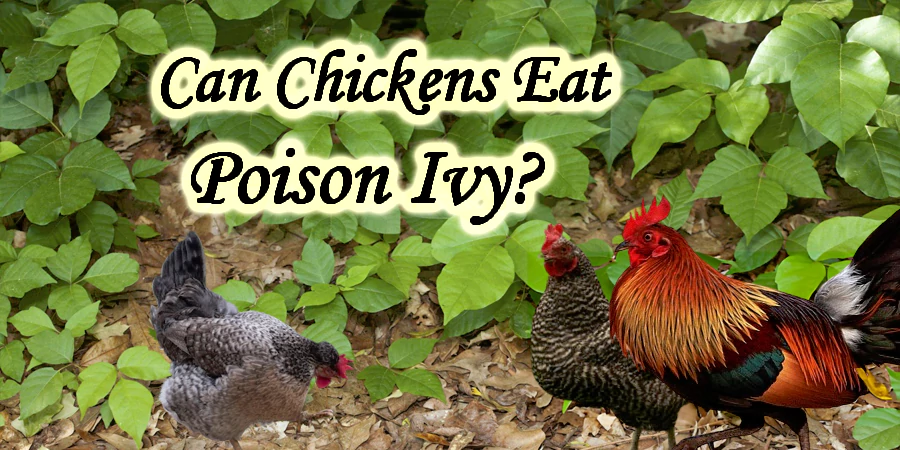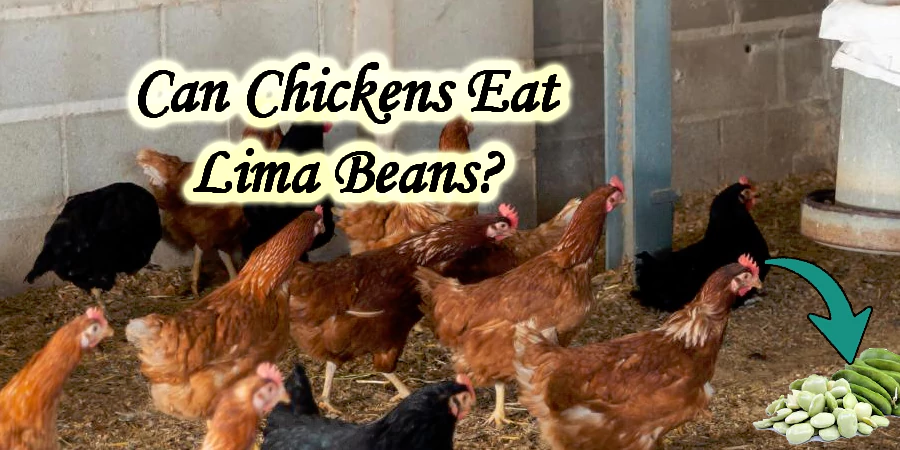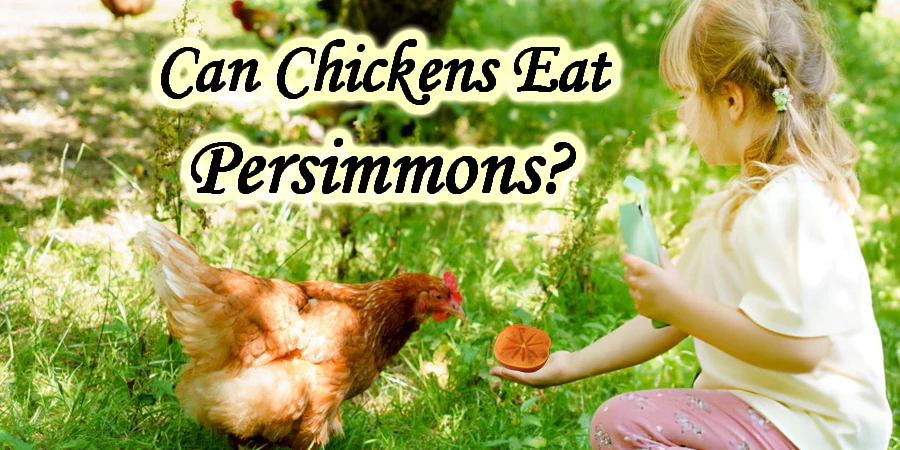Can Chickens Eat Poison Ivy : A Nightmare For Chickens
Published: 13 Jan 2024
Can chickens eat Poison ivy safely is one of the most common queries raised by chicken owners. Poison ivy is considered a green villain for humans and animals. We will dive into the realm of toxicity content in Poison Ivy and give you a convincing reply to this old-age query. Every chicken enthusiast wants to serve a delightful feast to their beloved feathered companions but they are also concerned about their health issues.
We will define the boundaries for our flock and unravel the scientific facts about the effects of eating poison ivy for chickens. We have consulted with some experienced chicken owners who have proven their expertise in serving their flock over the years. We must wisely consider the pros and cons of any diet before feeding it to our flock. So, get ready for a journey in which we will unravel the mystery of feeding poison ivy to chickens. Who knows the truth may surprise you!”

Can Chicken Eat Poison Ivy: Is it a Life-Threatening Plant?
What is the Poison Ivy?
It is a shrub or green vine with compound leaves. This wild vine is native to North America and can be found near the river or wooded soil. It is famous for its chemical reactivity which may cause damage to the contacted part of the body. This allergic reaction may show signs of redness, swelling, itching, and blister on the touching body.
This allergic reaction is mainly due to a substance called Urushiol. This reactive substance lies in its sap. This substance is hazardous for animals as well. So, the toxicity of Poison Ivy will be our main study to understand its side effects for chickens. Now question arises of how will you identify its presence to avoid any physical contact.
Appearance and Identification of Poison Ivy:
Poison ivy can be in various shapes and colors depending on its location and type. Here, we will introduce you to some of its most common features that may be helpful in its recognition or identification.
- It consists of compound leaves with three leaflets.
- The shape of these leaflets is identical to almond and pointed tips.
- The leaves may resemble the oak leaves with smooth lobes.
- The leaflets are arranged nicely along the stem.
- Its leaves change color according to the season.
- Green in summer and spring, and in fall it will be changed to red or orange leaves.
- The woody stem is its symbolic identity.
- Yellow or white color berries in the summer season can also help in identification.
- It can be found in woody, open areas, and along the fences.
Chemical Composition of Poison Ivy
The chemical composition is primarily centered on the substance called Urushiol. So, we will present a structural composition of Poison ivy focusing on Urushiol.
Urushiol: It is an oil resin that is reactive in its chemical nature. The scientific study of Urushiol suggests that it comprises hazardous chemicals named Pentadecycatechols and heptadecylcatechols. Its oily composition makes it adherent to the surface of the skin. Urushiol lies across the various parts of Poison ivy as stems, roots, and leaves.
As the composition suggests it is not a recommendable diet for chickens. The intensity of toxic agents in Poison ivy must be determined to judge its reactive potency for chickens and humans. Now one might think that what should be done if chickens have eaten this highly allergic substance Urushiol? Here we go with a discussion of mitigating the effects.
What to do if Chickens Eat Poison Ivy?
When you witness the ingestion of Poison ivy by your flock then you should act promptly to mitigate the harmful effects of Urushiol. In this case, don’t panic and act wisely. Here are some of the steps that you can apply to counter the side effects of eating poison ivy.
- After analyzing the signs and symptoms of an allergic reaction, manage to isolate the affected chickens to reduce the spread of allergy.
- Consult with a professional veterinarian and tell him the actual situation of the allergic reaction( signs and symptoms witnessed)
- Hydration can play a vital role in flushing out these toxic agents. Ensure the water supply access to these affected chickens.
- Keep a close eye on the signs and symptoms and document the changes. Discuss these changes with any expert veterinarian.
- Carefully understand the instructions from your veterinarian and cautiously implement the directed steps.
- Take practical steps to restrict access to poison ivy. Use fencing or remove the Poison ivy plants from the location.
How to Kill Poison Ivy?
It is inevitable to remove the Poison ivy from your surroundings to avoid any unpleasant disastrous situation for your flock. It requires appropriate safety measures to eradicate it. Here are some pragmatic steps that you can take to completely demolish Poison ivy and safeguard your chickens.
Use of herbicides: Some chemical herbicides can kill poison ivy. The glyphosate or triclopyr products are helpful in this regard. The application method is labeled on each of the herbicide descriptions. Apply directly on leaves and stems of Poison ivy for good results. It is also advised to apply these herbicides when the poison ivy plant is in its growth phase. It can be repeated till the complete removal of this hazardous plant.
Manual removal: Besides the use of chemical herbicides, it is also a supportive tactic to remove it manually. Ensure the proper safety gear before physical contact with this poisonous vine. After manual removal, take it in sealed bags and dispose of it.
Prevent Regrowth: After completing the manual removal, you must ensure that this shrub should not rooted again. To prevent its regrowth it is suggested to use geotextile fabric as a barrier.
Proper Dispose-Off: Disposing of the poison ivy is also important. It is advised to never dispose of poison ivy by burning it. It is also observed that smoke from this plant can affect the respiratory tract of chickens. So avoid its burning.
Can Chickens Eat Poison Ivy Leaves
It is also one of the most asked queries by chicken enthusiasts. The simple answer is A BIG NO. As we have already discussed earlier Leaves of Poison Ivy also contains Urushiol substance which is very toxic for chickens. It is the prime duty of chicken owners to provide a healthy diet to their clucking companions and poison ivy leaves are not a healthy feed for chickens by any means.
Some of the chicken owners think about it lush green color of leaves as a good nutrient source. It is a big mistake and feeding leaves of poison ivy is strongly prohibited by our experts and chicken nutritionists. So, please get your flock to stay away from poison ivy leaves.
Can Chickens Eat Poison Ivy Berries?
Like other parts of Poison ivy, berries also contain a reactive substance called Urushiol. So, we can easily answer it never feed your chickens these poison ivy berries. If you are looking for some additives to diversify the diet plan for chickens then go with some safe grains, seeds, and fruits. It is not confirmed how much adverse effect these berries have on chicken health but they are not recommended at all from our side. You can consult your veterinarian about the consequences according to your location and breed.
Potential Risks of Feeding Poison Ivy to Chickens
As we have already discussed Poison ivy has a chemical reactive substance “Urushiol” which creates problems for chickens. Some chicken owners said that Urushiol is less dangerous for chickens as compared to humans but there are some serious threats for chickens. We have managed to collect some risk factors of feeding Poison ivy to chickens. These factors will help you to make a well-thought-out decision about our main query “Can chickens eat poison ivy?”
|
Alternatives to Poison Ivy for Chickens
As we are convinced that Poison Ivy is not the best or healthy food for our chickens. Now we have to replace it with some nutritious foods that serve more benefits and minimum risks for chickens. It is advised to focus on a formulated diet for better growth of your chickens. To diversify the diet pattern, you can use these foods occasionally.
- Fruits: fruits are an appetizing and delectable dietary option for poultry animals. We have observed that most of the chicken enthusiasts serve melons, bananas, persimmons, and other fruits to their flock.
- Berries: Berries are tasty food for chickens. They love to enjoy this juicy fruity treat with berries. Poultry experts often use blueberries, raspberries, strawberries, and cranberries for chickens.
- Vegetables: Leafy greens are a good source of calcium, potassium, and other nutrient which support the development of feathered birds. Arugula, cabbage, lettuce, and spinach are good options.
- Beans: Beans are considered a mini powerhouse for chickens. They promote the physical activity of foraging or pecking in your flock. Baby chickens have no choking issues. Lima beans and black beans are widely used by chicken owners.
- Seeds: Seeds contain a wide range of nutritional benefits for chickens. It can mesmerize the baby chickens with taste and palatability. Flax seeds, hemp seeds, pumpkin seeds, and chia seeds.
Conclusion
After a detailed analysis, we are convinced that feeding poison ivy to chickens is highly dangerous for their health. So, we never recommend the intake of Poison ivy to chickens. Always protect your flock from this toxic chemical substance called Urushiol. We have briefly elaborated on the side effects of Poison ivy for chickens. Considering the risk factors we can easily decide that chicken can’t eat poison ivy.
All chicken enthusiasts must prevent the access of chickens to such toxic plants and shrubs. If a chicken is effected by these chemical reactive substance, you must cautiously observe the allergic signs and report to your nearest veterinarian. Provide some safe and healthy additives to your chickens.
- Be Respectful
- Stay Relevant
- Stay Positive
- True Feedback
- Encourage Discussion
- Avoid Spamming
- No Fake News
- Don't Copy-Paste
- No Personal Attacks
- Be Respectful
- Stay Relevant
- Stay Positive
- True Feedback
- Encourage Discussion
- Avoid Spamming
- No Fake News
- Don't Copy-Paste
- No Personal Attacks


